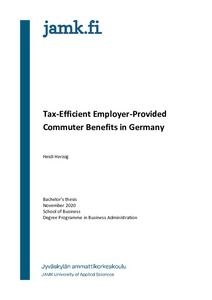Tax-Efficient Employer-Provided Commuter Benefits in Germany
Herzog, Heidi (2020)
Herzog, Heidi
2020
Julkaisun pysyvä osoite on
https://urn.fi/URN:NBN:fi:amk-202101061044
https://urn.fi/URN:NBN:fi:amk-202101061044
Tiivistelmä
Germany aims to reduce greenhouse gas emissions. On business days, about two-thirds of the total transport volume of employed people is due to job-related mobility. The 2030 Climate Program promotes climate-friendly mobility. Energy consumption topics are included in the German Income Tax Act. Taxation is known to have an impact on changes in the economic behaviour of individuals and companies. Germany has been coping with labour shortages. Employers must carefully prepare their employee attraction strategies to successfully recruit talents. Benefits will help to win and retain professionals. Employer-provided benefits are costs to the company and taxable income for the employee. The major employer-provided commuter benefits in Germany have been described.
The aim was to analyse these from the income tax perspective. The research problem was which of these commuter benefits are most advantageous to an employee on the income tax-efficiency point of view. A decision is tax-efficient when the tax liability is lower compared to an alternative structure but achieves the same goal. The research was carried out using a comparative method. Official documentation, such as legislation and government documentation, was used in the content analysis. Spreadsheet software was used to produce the results in the form of descriptive tables.
Several commuter benefits, for public transport, can be offered income tax-efficient to employees. Furthermore, the sole electric motor vehicle, the fuel cell vehicle, and the externally rechargeable hybrid electric vehicle are a tax-efficient alternative. The same applies to subsidies for bikes. The one-size-fits-all commuter benefit does not exist. Tax-efficiency can be reached by building a model of some well-selected tax-efficient commuter benefits with climate-friendly alternatives.
The aim was to analyse these from the income tax perspective. The research problem was which of these commuter benefits are most advantageous to an employee on the income tax-efficiency point of view. A decision is tax-efficient when the tax liability is lower compared to an alternative structure but achieves the same goal. The research was carried out using a comparative method. Official documentation, such as legislation and government documentation, was used in the content analysis. Spreadsheet software was used to produce the results in the form of descriptive tables.
Several commuter benefits, for public transport, can be offered income tax-efficient to employees. Furthermore, the sole electric motor vehicle, the fuel cell vehicle, and the externally rechargeable hybrid electric vehicle are a tax-efficient alternative. The same applies to subsidies for bikes. The one-size-fits-all commuter benefit does not exist. Tax-efficiency can be reached by building a model of some well-selected tax-efficient commuter benefits with climate-friendly alternatives.
